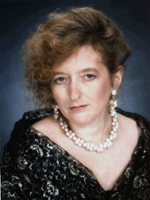| |


Read the bonus material while you listen
|
|
Get a Sneak Peek of this Episode
|
 |
|
Esther Friesner is an award-winning and best-selling author with over 30 books to her name, including Men In Black 2, E.Godz with Robert Asprin, Nobody's Princess, Sphinx's Princess, and two Star Trek novels. She's also the editor of the Chicks in Chainmail anthologies. Esther Friesner has won two Nebula awards, the Romantic Times award for Best New Fantasy Writer and the Skylark Award.
|
This episode originally aired on 11/26/2009 with the following authors:
Note: The following interview has been transcribed from The Author Hour radio show. Please excuse any typos, spelling and gramatical errors.
Interview with Esther Friesner | | |
Bonus Question(s) that Didn't Air on the Live Radio Show
Note that you can also listen to this while you read it.
[Are you drawn towards] the humorous side? Cause you do have a lot of humor in your books.
Esther Friesner:
I do. I do because humor, if itís well done, can make people think about things, especially things that might need a little bit of correcting in the way we are acting towards one another. And using humor to open up peopleís minds, to make them think about things the way they might not have done because, well, you know, you go through your day, youíre working hard, and especially now in this economy people are working hard and are a little bit frightened, because, well, it was a perfectly good economy and then well, somebody broke it. Iím not naming any names, but a few years back it was working perfectly fine. Anyhow, yes, the thing is that humor is a gentle way to get people to look over there and see that perhaps what youíre doing here is not the best you could be doing for this world.
Itís supposed to teach; itís supposed to make you think. Itís not supposed to be hitting you over the head with a moralizing hammer, because most people just run away from that, like crazy. I like it when somebody comes over to me and says, ďYou know, what you wrote, this particular story, it did make me realize--oh! You know, youíre right.Ē And some of my favorite humorists to read do exactly that.
Matthew Peterson:
I like to read humor because it helps me to realize, you know, life has a lot of bad things in it, but also thereís a lot of good stuff; thereís a lot of funny things.
Esther Friesner:
Oh yes!
Matthew Peterson:
You can make fun of lots of funny things.
Esther Friesner:
Yes. And weíre basically nice. Most human beings are good. Really, because if we werenít, what would the news be? The news wouldnít be, this went wrong and that went wrong. The news would be ďMan adopts kitten.Ē Because itís something out of the ordinary. But no, the news is the bad things, usually.
Matthew Peterson:
Yeah.
Esther Friesner:
Sometimes itís a good thing.
Matthew Peterson:
Now, I have to say something. My wife, she told me about this interesting story, and I think youíll get a kick out of this. So the police are chasing this car; itís driving erratically. And the car pulls into a driveway and a little 8-year-old boy runs out and goes into the house. And it was an eight year old boy . . .
Esther Friesner:
Oh dear.
Matthew Peterson:
. . . whoíd gotten in a fight with his dad, and he said, ďI hate youĒ or something like that and ran out the house and got the keys and got into the car. [laughs]
Esther Friesner:
Oh my gosh!
Matthew Peterson:
You know, itís like, wow! And they said, ďWell, he does have a video game, a car racing video game, and so somehow or another he must have discovered how to drive a car. [laughs]
Esther Friesner:
Oh, yes he did! How did he reach the pedals?
Matthew Peterson:
I guess what they said is that he would go down and floor onto the pedal and then come back up and put his head over the steering wheel.
Esther Friesner:
Oh, thank heaven he was alright!
Matthew Peterson:
Oh, I know, he was safe.
Esther Friesner:
Oh my Lord.
Matthew Peterson:
But they have video of it because the police officer cars now have video. I just couldnít believe it. Itís just one of those things. Iím glad he wasnít hurt of course, and nobody was hurt, but just when you think about it later on, itís unusual.
Esther Friesner:
Well, one of my favorite humor quotes is by Beaumarchais who wrote The Barber of Seville. I think, well, whatever Figaro is based on, and he said, ďI laugh so that I am not obliged to weep.Ē Because some of the things you see in the world can make you feel so angry and so helpless, but if youíre able to approach them with humor, you can sometimes conquer them. Tyrants are afraid of humor because it cuts them down to size. And Iíll tell you something about humor, which has probably been attested to. My father was a Holocaust survivor. And he came out of the Holocaust with his sense of humor intact and active. He was a brilliant man and he could still take a joke and make a joke. My time with my father, he would read Pogo to me; he would watch Rocky and Bullwinkle with me. And heís the reason why I am one of the apparently few women who like The Three Stooges.
Matthew Peterson:
[laughs]
Esther Friesner:
We would watch The Three Stooges together and he got me interested in Danny Kaye and Victor Borge. Now there is a book called, I donít know if itís still in print or not, but itís called, ďLaughter in Hell.Ē And itís about humor during the Holocaust and about how people used humor as a device to keep their spirits up and to get through. And then you have the Roberto Benini, Life is Beautiful movie, which came out much later than the book. Same deal. And itís true; humor is a marvelous, marvelous weapon.
Extra Material That was Cut from the Show Because of Time Constraints
Note that you can also listen to this while you read it (you'll need to fast forward past the bonus questions).
Esther Friesner:
[talking about co-authoring with Robert Aspirin] . . . and I finally met him, but it was long after the book was done.
Matthew Peterson:
What was it? I wrote it down . . . letís see.
Esther Friesner:
E.Godz. Yes.
Matthew Peterson:
E.Godz, yeah, that was the book. And so how much input did he have?
Esther Friesner:
Well, the way it worked, when I signed the contract, I didnít know how it was going to work, and then I was told that he was going to write the outline and I was going to write the book. And so I received the outline which said whatís supposed to happen in each chapter and took it from there and turned it in and Bobís your uncle.
Matthew Peterson:
Yeah. Bobís your uncle and Bob is his name. [laughs]
Esther Friesner:
Yes, Bob is in fact, your uncle.
Matthew Peterson:
That is, yes.
* * * * * * * * * *
Esther Friesner:
[referring to Terry Pratchett at the Discworld convention that we were at] And Iíll tell you, itís good that Terry talks, because heís always so wonderful.
Matthew Peterson:
Yes.
Esther Friesner:
He has such nice insights. You know itís not all jokes. Heís . . . I have said it, and I will say it again, he is a genius and itís marvelous that we have his work.
Matthew Peterson:
Yeah.
Esther Friesner:
Yeah.
Matthew Peterson:
And hopefully weíll get more. [laughs]
Esther Friesner:
Yes!
Matthew Peterson:
Lotís more.
Esther Friesner:
Try and stop him.
Matthew Peterson:
Yes.
* * * * * * * * * *
Matthew Peterson:
Temping Fate, from Penguin.
Esther Friesner:
Oh, itís Temping, Temping, not Tempting.
Matthew Peterson:
Temping.
Esther Friesner:
Right, because the girl is a Temp, who works for the Greek gods.
Matthew Peterson:
Ah. And Nobodyís Princess.
Esther Friesner:
Nobodyís Princess and Nobodyís Prize.
Back to Top
|
Share this interview with your friends!
|
| |
|
|